#Tabletop Roleplaying
Text
I just received a large brass coin with an emblem of a cartoon rat on it in the mail. It was literally the only thing in the envelope – there wasn't even an explanatory card. I presume this is a reward from one of the several dozen crowdfunded tabletop RPGs I've backed over the course of the past decade, but I genuinely have no recollection which – if any – of them it might be, so it's honestly all a bit sinister.
3K notes
·
View notes
Text
youtube
An absolutely incredible review of the beta version of Eureka: Investigative Urban Fantasy by review Willy Muffin on youtube, complete with visuals and actual analysis!
I'm going to also add to this post a comment that I left on the video, offering further insight into the design intentions of the game, though the comment might not make as much sense if you haven't watched the video yet.
Hey, lead writer of Eureka here, first of all I wanna say how good and professional this review is, it’s almost indescribable how it feels to see our project taken so seriously and given real analysis, complete with visuals and everything! We would be super impressed and happy with it even if you didn’t like the game—but luckily it sounds like you loved it hahaha
I’d also like to address a few things throughout the video, not as arguments or rebuttals, just further developer insight for everyone
Re: “Urban Fantasy.” “Urban Fantasy” is basically just another term for “modern fantasy”, just a fantasy story that takes place in the 20th or 21st century and deals with the intersection of contemporary life with the supernatural, and it might be an Americanism, or even a Southern-ism, since it has a lot of connections and origins in the living folklore of New Orleans, so I shouldn’t be surprised it isn’t a term everyone is familiar with. Just think of it as the kind of genre where instead of the vampire living in a secluded scary castle, his name is Phil and he’s your roommate haha. What We Do in the Shadows, Shadowrun, and the World of Darkness games are all some other good examples of “urban fantasy.”
Re: Scooby-Doo. Oh we would LOVE for you to run a Scooby-Doo-like wacky mystery with Eureka. Even though the main tone is dark and gritty and noir, we did intentionally build it so that it could run more lighthearted stuff as well! There’s even a few Scooby-Doo references to be found throughout the text, and if we hit a certain stretch goal on the Kickstarter, we’re going to be adding a bunch of Scooby-gang-inspired traits, including the option to play a Talking Dog!
Re: Combat being the largest section, even larger than Investigation. First of all, that’s kind of an illusion that is the result of the game being unfinished. I have a tendency when I write rules to use really long sentences, overexplain things, repeat myself, etc, and that dramatically bloats the rules text and page count, but that’s why we have an editor! She goes through after the fact and trims most of the fat off my bloated writing style to make it flow smoother and read faster, and take up less space. The PDF that was read for this review has had the Investigation chapter copy-edited (and cut down in size by about 25%!), but the editor hasn’t gotten to the combat chapters yet, so they still have a hugely inflated page count. When she’s done with them, you can expect each combat chapter to also be cut down in size by about 25%, so they won’t be nearly so large a chunk of the book.
Secondly, I’ll explain our reasoning for why the combat chapters and advanced combat rules are such a big chunk of the rules text, it’s intentional design which I will now explain. If anyone still doesn’t agree with that design, that’s fair, and that’s why we made the Basic Combat Rules an option.
The reason that the advanced combat rules are the default, and the reason they exist at all, is because it incentivizes and rewards Investigation. If combat is super deadly, it makes Investigation, snooping, and spying more appealing than kicking down the door and getting your head blown off. But of combat is super deadly, it also needs to be very deep and tactical, because if it’s deadly but shallow, then there’s no player agency. “Combat starts, roll some dice, okay your guy is dead.” That’s no fun. So by adding rules and modifiers for cover/elevation, distance, the difference between a pistol and an assault rifle, etc. we make it so that not only is combat its own high-stakes puzzle, but make it so that when the PCs HAVE to engage in combat, all their investigation can really pay off and save their lives. Spying on a building to find out the number of goons stationed there and how they are armed helps you plan and assess risk, stealing the blueprints to the building helps you know how to get the drop on the goons, and know the best places to attack from so that they are stuck out in the open and you are not, etc. and having rules for those things means that all the PCs’ snooping and planning makes a real mechanical difference in whether they live or die.
That’s just my opinion though, and one of the biggest reasons WHY we decided to write the combat with as much depth as we did.
Anyway, thank you again for this review and analysis of our project, our Kickstarter jumped up by about ten more backers in the evening when this video went up after several days of no new backers, and we have to assume we have this video, and all of you watching and reading this, to thank. You’re really making our dreams come true. :)
Eureka: Investigative Urban Fantasy is kickstarting from right now until May 10th! Back it while you still can!

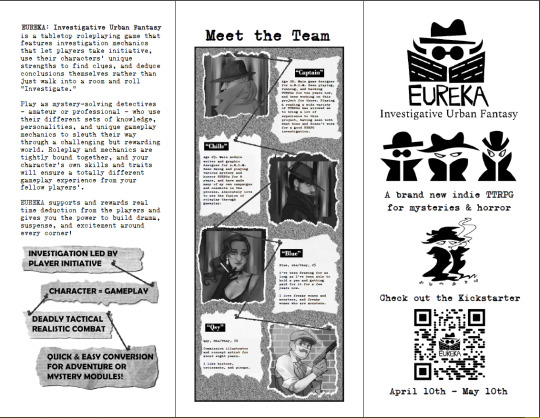

youtube
If you want to try before you buy, you can download a free demo of the prerelease version from our website or our itch.io page!
If you’re interested in a more updated and improved version of Eureka: Investigative Urban Fantasy than the free demo you got from our website, subscribe to our Patreon where we frequently roll our new updates for the prerelease version!
You can also support us on Ko-fi, or by checking out our merchandise!
Join our TTRPG Book Club At the time of writng this, Eureka: Investigative Urban Fantasy is the current game being played in the book club, and anyone who wants to participate in discussion, but can’t afford to make a contribution, will be given the most updated prerelease version for free! Plus it’s just a great place to discuss and play new TTRPGs you might not be able to otherwise!
We hope to see you there, and that you will help our dreams come true and launch our careers as indie TTRPG developers with a bang by getting us to our base goal and blowing those stretch goals out of the water, and fight back against WotC's monopoly on the entire hobby. Wish us luck.

#traveler#willy muffin#monsters#ttrpg#rpg#eureka: investigative urban fantasy#tabletop#eureka#roleplaying#ttrpg community#ttrpg tumblr#dungeonsanddragons#dungeons and dragons#indie rpg#indie ttrpgs#ttrpg design#vampire#monster girl#noir#neo-noir#neo noir#columbo#tabletop roleplaying#tabletop role playing game#tabletop games#roleplaying games#lgbt art#lgbtttrpg#lgbt ttrpg#lgbt creator
30 notes
·
View notes
Text
you make your ttrpg character
you give them a skill they're really good at
you crit fail every time they have to do it
17 notes
·
View notes
Text



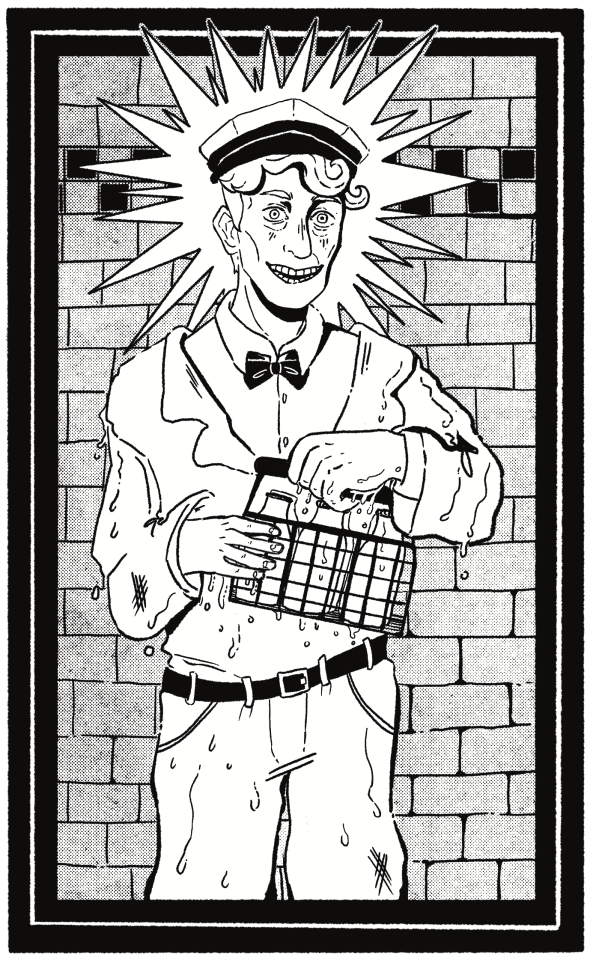
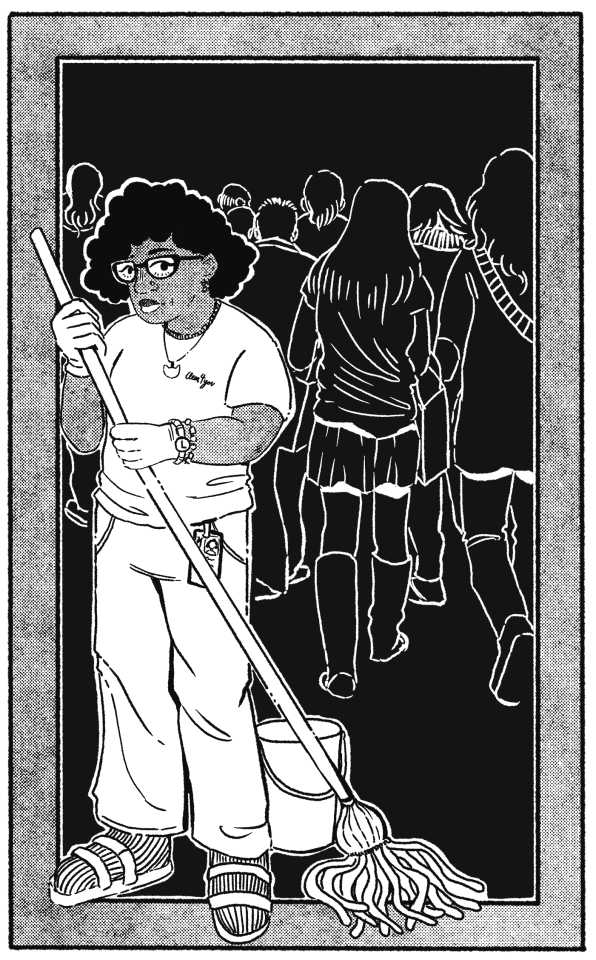
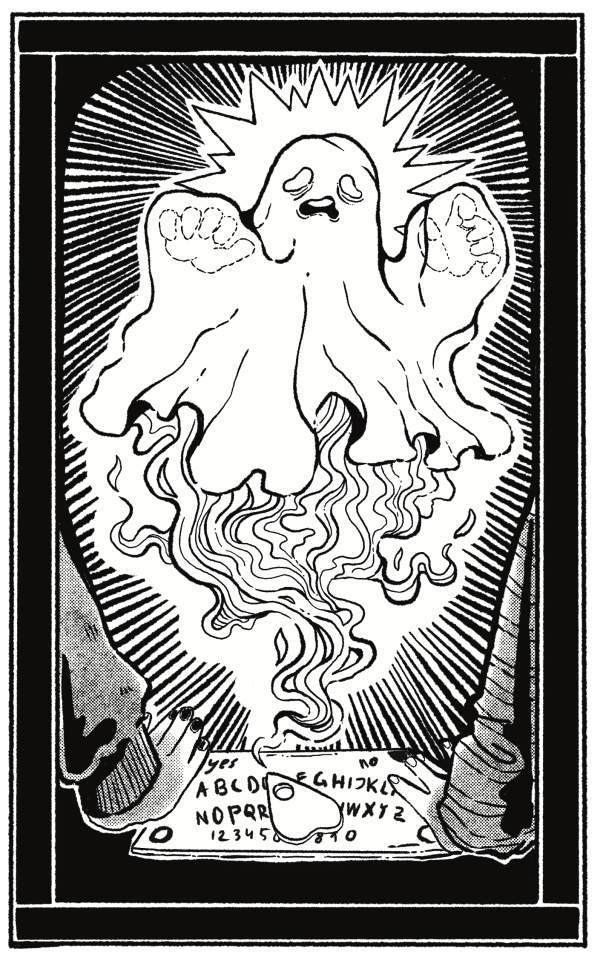
Art from the amazing @mixmioart for a new Troika module;
The Waifs and Strays of Longshot City!
Six new troublemakers for Superhero TTRPG campaigns!
In order of appearance here;
PACKRAT - Junk collecting mutant rat, with a trash-can cannon.
DR. IRT - A worm-loving mad scientist; teeth slick with worm-juice.
DAYCARE - An infant hivemind, trying to get back to its family.
THE MILKMAN - The unaging god of milk awoken in a mortal shell.
KAT - Master thief, unseen by all.
BANQUO - Spectral prankster half-mad in undeath.
Designed for the excellent Troika spin-off Longshot City.
Grab it for $1 here; the plain-text is free! Thanks everyone!
(Psst... There's also a chart of d36 Lesser Powers included for all your underpowered superhero needs!)
#indie ttrpg#ttrpg#dnd#ttrpg community#troika#superhero#tabletop roleplaying#ttrpg dev#ttrpg art#black and white#dungeon master#tabletop games#comic art#comics
15 notes
·
View notes
Text
It's a great day to consider the vast array of other RPGs out there other than D&D. If you want that style of game, Pathfinder is great. And if you feel like trying something new, there's so much to explore...
Amazing timing for this article to come out the day Critical Role opens the beta for their own RPG system...
1K notes
·
View notes
Text
TTRPGs for Trans Youth Bundle live!
I'm fundraising for Emerge, my local trans youth group after their funder pulled their grant. Almost 70 TTRPG creators donated almost 120 games and supplements, and you can get them all for $5!
There's some killer stuff in here - Void 1680AM, Slugblaster, Moonlight on Roseville Beach, Foul Play, Valiant Horizon, Lilancholy, .dungeon//remastered, Bump in the Dark, supplements for Bastards, Beam Saber, Girl by Moonlight, and a whole bunch more.
Everything raised will go towards keeping Emerge running, including paying for events (like going to Trans Pride 2024) and workshops for the group!
Thank you so much to everyone who donated games and supplements for this, you're all collectively the best! And if you can't afford $5 right now, just share the post! That's enough!
896 notes
·
View notes
Text

We got there!
701 notes
·
View notes
Text
6K notes
·
View notes
Text

3K notes
·
View notes
Text

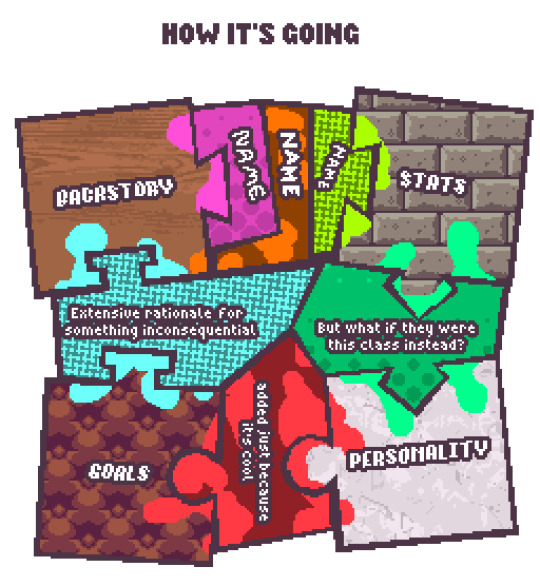
Been sitting on this one for a while.
Anyone ever experience this?
343 notes
·
View notes
Text
thinking about how cursed objects work in most fantasy RPGs.
typically, they wind up just kind of being a big middle finger from the game master - a kind of "whelp, you should have been more paranoid, so now you get hosed" sort of deal. which includes the somewhat game-y trope of objects that you can't get rid of. it's kind of an un-fun mechanic, when you think about it, which is why in most games I've been a part of cursed items often don't see much play, unless it's as a "punishment", or part of a story arc.
...which naturally leads me to think about how to do it better. in the past, I've tried using a curse as a kind of limiter. restrictions or drawbacks to a mostly functional item that is still worth using despite being "cursed". that's good, but it doesn't let you draw on truly nasty curses, because the item needs to be worth using, but also still needs to be balanced.
so, I'm drawing from a lot of sources here, like the cursed shield in Final Fantasy VI, and especially the comics by @foldingfittedsheets, where curses exist to (literally) teach the recipient a lesson
MEAT OF THE POST STARTS HERE:
what about cursed items that have a way to overcome their curse?
it's actually a fairly common trope in classical literature / fairy tales. every curse has a way to be broken. yet in D&D and Pathfinder, most often the only way to break a curse is to find someone with the specific curse-breaking spell.
so, give each cursed item a condition. perhaps a weapon that fuels a person's rage and causes them to fly into a blind rage in battle waits for them to sincerely forgive a hated enemy. perhaps boots that slow the wearer are actually making them heavy with the weight of past transgressions and a sufficient act of atonement will free them. maybe the perpetually bloody doll that gives its bearer horrible nightmares simply waits for someone to be motivated to action by them, either to right some past wrong, or generally bring a certain number of murderers to proper justice.
...maybe a Bag of Devouring. which is technically actually a creature, not a cursed item (but usually classified with them), can be befriended by figuring out a treat it likes, and will not only carry things for the player if fed and cared for, but even cough up a few things that previous bearers had stuffed inside.
the specifics aren't too important, but the idea is that any item with a curse on it has a reason for that curse, and a way to break it. the players can drop the item at any time, sell it off, give it to someone they hate, whatever, but if they put in the time and energy to actually breaking the curse, it becomes better than it was before, sometimes simply losing a drawback, or sometimes gaining new powers.
for an example, let's look at how that doll idea from earlier could work in D&D 5e;
while the party has the doll in their possession, they will all be afflicted by horrible nightmares, seeing themselves as children being attacked by a group of eight bandits with indistinct features. the details of the dreams change each night, and the players awaken before learning their ultimate fate, but the general gist is always that they are completely helpless, and subjected to harm.
after a long rest, have them roll a Wisdom or Charisma save (challenging DC, but not too difficult), or take a small amount of psychic damage.
if the players bring murderers to justice - meaning deliver them to the proper authorities and see them punished for their crimes - the content of the dreams starts to change. one bandit gets caught or killed by the end of the dream for each real world criminal successfully punished, possibly hinting to the players what they need to do. once eight murderers in total have had their sentences enacted, the next morning the doll will be in pristine condition with a serene expression, emitting a faint glow. thereafter, any player may attune to the doll to gain the ability to cast the Guidance cantrip without components (as thought the doll's ability to project what it wants the players to do into their mind was turned to their benefit.
#tabletop gaming#tabletop roleplaying#roleplaying games#dungeons & dragons#pathfinder#game master advice#homebrew#my ideas#curses#cursed items#long post
224 notes
·
View notes
Note
Honestly it's weird that roleplaying as we know it evolved from historical wargaming.
Like for example DBA rules contain some suggestions for running campaigns with narrative and "propaganda" so I wouldn't say that it's something incompatible, and 0E looks way more like wargames than say PbtA games do, but storytelling games were a feature of artistic salons for way longer and they appear much closer to roleplaying than rulesets for reenacting ancient battles on tabletop.
Salon games didn't have skill checks but neither did wargames and it's strange that nobody came up with simplistic skill checks to add uncertainty and realism to the game
I think the line is a lot clearer when the role of dice and rules in tabletop roleplaying games is correctly understood.
"Uncertainty" and "realism" are, at best, secondary to what the dice are actually doing. Even most tabletop RPGs get it wrong when they try to explain themselves – they'll talk about the rules as something to fall back on to prevent schoolyard arguments (i.e., "yes I did!/no you didn't!") from derailing the story, when in fact it's the exact opposite.
If we look at freeform roleplaying as an illustrative parallel, we see that, while newly formed groups may in fact fall to bickering when a consensus can't be reached about what ought to happen next, mature and well-established groups tend instead to fall prey to excessive consensus-seeking: the impulse to always find an outcome that isn't necessarily one which everybody at the table can be happy with, but at the very least one which everybody at the table can agree is reasonable – and that's a lot more constraining than one might think.
In this sense, the role of picking up the dice isn't to build consensus, but to break it – to allow for the possibility of outcomes which nobody at the table wanted or expected. It's the "well, this is happening now" factor that prevents the table's dynamic from ossifying into endless consensus-seeking about what reasonably ought to happen next.
Looking to the history of wargames, this is precisely the innovation they bring to the table. Early historical wargames tended to be diceless affairs which decided outcomes by deferring to the judgment of a referee or other subject matter expert, but the use of randomisers increasingly came to be favoured because referees would tend to favour the most reasonable course, precluding upsets and rendering the outcomes of entire battles a foregone conclusion. This goes all the way back to the roots of tabletop wargaming – people were literally having "rules versus rulings" arguments two hundred years ago!
(This isn't the only facet of tabletop roleplaying culture which has its roots in wargaming culure, of course. For example, you can draw a direct line from the preoccupation of early tabletop RPGs with punishing the use of out-of-character knowledge to historical wargaming's gentleperson's agreement to refrain from making decisions based on information that one's side's commanders couldn't possibly have possessed when re-creating historical battles.)
To be clear, I don't necessarily disagree that salon games could have yielded something like modern tabletop RPGs. However, first they'd have had to arrive at the paired insights that a. excessive consensus-seeking is poison to building an interesting narrative; and b. randomisers can be used to force the breaking of consensus, and historical wargames had a substantial head start because they'd figured all that out a century earlier.
1K notes
·
View notes
Text
Help Save the World of TTRPGs and Their Creators.
Okay I’m being a little dramatic, but at the same time I’m pretty serious. This is a call to action, and the livelihoods of myself and lots of other people, many of them (like myself) disabled, are depending on it. This is a post about why, what you can do about it, and (perhaps least often answered) how.
This post is actually an accompaniment to another discussion by someone else. If you don’t want to listen to a 90-minute in-depth discussion of much of what I’m about to tell you, you can just keep reading. Otherwise, click here or here and listen to this either before or after you read this post. (They’re the same thing, just different sources.)
If you have ever made or reblogged posts urging people to switch from Google Chrome to Firefox, you should be willing to at least give a try to other TTRPGs besides D&D5e for much the same principle reasons. I’m not telling you you have to hate D&D5e, and I’m not telling you you have to quit D&D5e, I’m just asking you to try some other games. If you don’t like them, and you really want to go back to D&D5e, then go back to D&D5e. But how can you really know you won’t like other games if you have literally never tried them? This post is a post about why and how to try them. If you’re thinking right now that you don’t want to try them, I urge you to look below to see if any of your reasons for not wanting to try them are covered there. Because the monopoly that WotC’s D&D5e has on TTRPGs as a whole is bad for me as a game designer, and it’s bad for you as a game player. It’s even bad for you if you like D&D5e. A fuller discussion of the why and how this is the case can be found in the links above, but it isn’t fully necessary for understanding this post, it’ll just give you a better perspective on it.
If you’re a D&D5e player, I’m sure at some point or another, you’ve been told “play a different game”, and it must get frustrating without the context of why and how. This post is here to give you the why and how.
[The following paragraph has been edited because the original wording made it sound like we think all weird TTRPGs suck.]
Before that though, one more thing to get out of the way. I'm going to level with you. There’s a lot of weird games out there.
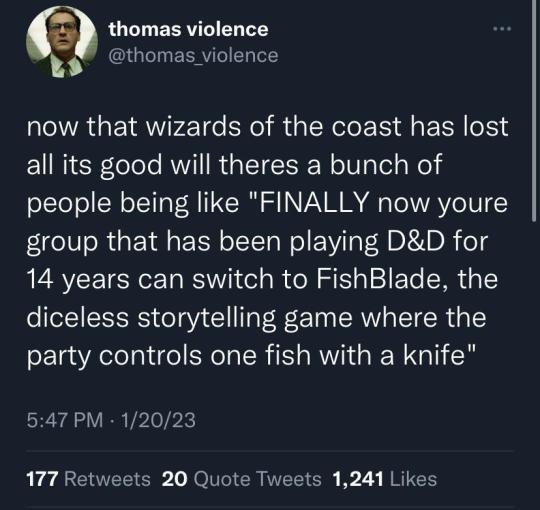
You are gonna see a lot of weird TTRPGs when you take the plunge. Many of them try to completely reinvent what a TTRPG even is, and some fail spectacularly, others really do even up doing something very interesting even if they don't end up being what a core TTRPG player wants. But not every indie RPG is a Bladefish, lots and lots of them are more 'traditional' and will feel very familiar to you, I promise. (And you might even find that you like the weird experimental bladefish type ones, these are usually ideal for one-session plays when your usual group can't play your usual game for any reason.)
You're also going to probably see a lot of very bad games, and man have I got some stories of very bad games, but for now I'm just saying to make sure you read the reviews, or go through curators (several of which will be listed below), before you buy.
Now that that is out of the way, I’m going to go down a list of concerns you may have for why not, and then explain the how.
“I don’t want to learn a whole new set of rules after I already spent so much time learning D&D5e.”
Learning a new set of rules is not going to be as hard as you think. Most other TTRPGs aren’t like that. D&D5e is far on the high end of the scale for TTRPGs being hard and time-consuming to learn and play. If you’ve only played D&D5e, it might trick you into thinking that learning any TTRPG is an overwhelmingly time-consuming task, but this is really mostly a D&D5e problem, not a TTRPG problem as a whole.
“D&D5e has all of these extra online tools to help you play it.”
So what? People have been playing TTRPGs without the help of computers for 50 years. To play a well-designed TTRPG you won’t need a computer. Yes, even if you're bad at math. There are some TTRPGs out there that barely even use math.
“I’m too invested in the narrative and characters of my group’s current ongoing D&D5e campaign to switch to something else.”
There are other games, with better design made by better people for less money, that are the same kind of game as D&D5e, that your current characters, lore, and plot will fit right into and do it better. And no, it's not just Pathfinder, there's others.
“I can’t afford to play another TTRPG.”
You probably can. If you’ve only played D&D5e, you might have been made to think that TTRPGs are a very expensive hobby. They aren’t. D&D5e is actually uniquely expensive, costing more than 3x more than the next most expensive TTRPG I can think of right now. Even on the more expensive end, other TTRPG books will cost you no more than $60, most will cost you less than $20, and a whole lot of them are just free. If you somehow still can’t afford another TTRPG, come to the A.N.I.M. TTRPG Book club mentioned below, nominate the game, and if it wins the vote we will straight up buy it for you.
(By the way, if you had any of the above concerns about trying other games besides D&D5e, that really makes it sound like you are in a textbook abusive relationship with D&D5e. This is how abusers control their partners, and how empires control their citizens, by teaching you to think that nothing could ever get any better, and even though they treat you bad, the Other will treat you even worse.)
“If I don’t play D&D5e, which TTRPG should I play?”
That’s a pretty limited question to be asking, because there will be no one TTRPG for everything. And no, D&D5e is not the one TTRPG for everything, Hasbro’s marketing team is just lying to you. (Pathfinder and PbtA are not the one system for everything either!) Do you only play one video game or only watch one movie or only read one book? When you finish watching an action movie like Mad Max, and then you want to watch a horror movie, do you just rewind Mad Max and watch it over again but this time you act scared the whole time? No, you watch a different movie. I’m asking you to give the artistic medium of TTRPGs the same respect you would give movies.
“I want to play something besides D&D5e, but my friends won’t play anything else!”
I have several answers to this.
Try showing them this post.
If that doesn’t work: Make them. Put your foot down. This works especially well if you are the DM. Tell them you won’t run another session of D&D5e until they agree to give what you want to do at least one try instead of always doing only what they want to do. This is, like, playing 101. We learned this in kindergarten. If your friend really wants to play something else, you should give their game a try, or you’re not really being a very good friend.
If that doesn’t work, find another group. This doesn’t even mean that you have to leave your existing group. A good place to start would be the A.N.I.M. TTRPG Book Club which will be mentioned and linked below. You can also go to the subreddit of any game you’re interested in and probably meet people there who have the same problem you do and want to put together a group to play something other than D&D5e. You might get along great with these people, you might not, but you won’t know until you try. Just make sure to have a robust “session zero” so everyone is on the same page. This is a good practice for any group but it is especially important for a group made of players you’ve just met.
“I only watch actual plays.”
Then watch actual plays of games that aren’t D&D5e. These podcasts struggle for the same reasons that indie RPGs struggle, because of the brand recognition and brand loyalty D&D5e has, despite their merit. I don’t watch actual plays, or else I would be able to list more of them. So, anyone who does watch actual plays, please help me out by commenting on this post with some non-D&D5e actual plays you like. And please do me a favor and don’t list actual plays that only play one non-D&D5e system, list ones that go through a variety of systems. The first one I can think of is Tiny Table.
“I can just homebrew away all the problems with D&D5e.”
Even though I want to, I’m not going to try and argue that you can’t actually homebrew away all the problems with D&D5e. Instead, I’m going to ask you why you’re buying two $50 rulebooks just to throw away half the pages. In most other good RPGs, you don’t need to change the rules to make them fun, they’re fun right out the box.
“But homebrewing D&D5e into any kind of game is fun! You can homebrew anything out of D&D5e!”
Firstly, I promise that this is not unique to D&D5e. Secondly, then you would probably have more fun homebrewing a system that gives you a better starting point for reaching your goal. Also, what if I told you that there are entire RPG systems out there that are made just for this? There are RPG systems that were designed for the purpose of being a toolbox and set of materials for you to work with to make exactly the game you want to make. Some examples are GURPS, Savage Worlds, Basic RolePlaying, Caltrop Core, and (as much as I loathe it) PbtA.
“I’m not supporting WotC’s monopoly because I pirate all the D&D5e books.”
Then you’re still not supporting the smaller developers that this monopoly is crushing, either.
Now, here’s the how. Because I promise you, there’s not just one, but probably a dozen other RPGs out there that will scratch your exact itch.
Here’s how to find them. This won’t be a comprehensive list because I’ve already been typing this for like 3 hours already. Those reading this, please go ahead and comment more to help fill out the list.
First, I’m gonna plug one of my own major projects, because it’s my post. The A.N.I.M. TTRPG Book Club. It’s a discord server that treats playing TTRPGs like a book club, with the goal of introducing members to a wide variety of games other than D&D5e. RPGs are nominated by members, then we hold a vote to decide what to read and play for a short campaign, then we repeat. There is no financial, time, or schedule investment required to join this book club, I promise it is very schedule-friendly, because we assign people to different groups based of schedule compatibility. You don’t have to play each campaign, or any campaign, you can just read along and participate in discussion that way. And if you can’t afford to buy the rulebook we’re going to be reading, we will make sure you get a PDF of it for free. That is how committed we are to getting non-D&D5e RPGs into people’s hands. Here is an invite link.
Next, there are quite a few tumblr blogs you can follow to get recommendations shown to you frequently.
@indierpgnewsletter
@indie-ttrpg-of-the-day
@theresattrpgforthat
@haveyouplayedthisttrpg
@indiepressrevolution
Plenty of podcasts, journalists, and youtubers out there do in-depth discussions of different systems regularly, a couple I can think of off the top of my head are:
Storyteller Conclave (I’m actually going to be interviewed live on this show on April 10th!)
Seth Skorkowsky
Questing Beast
The Gaming Table
Rascal News
Lastly, you can just go looking. Browse r/rpg, drivethrurpg.com, indie press revolution, and itch.io.
Now, if you really want to support me and my team specifically Eureka: Investigative Urban Fantasy, our debut TTRPG, is going to launch on Kickstarter on April 10th and we need all the help we can get. Set a reminder from the Kickstarter page through this link.
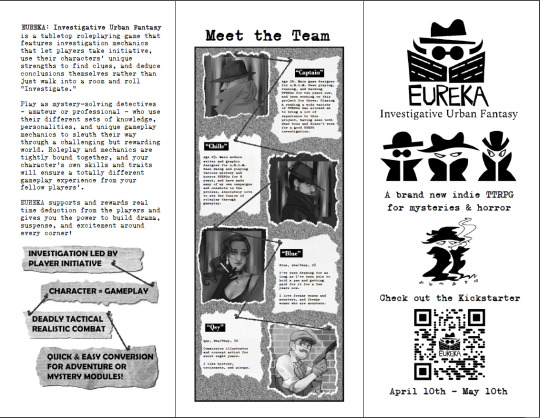
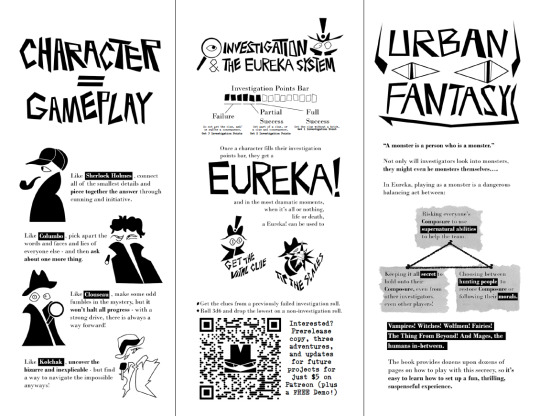
If you’re interested in a more updated and improved version of Eureka: Investigative Urban Fantasy than the free demo you got from our website, there’s plenty of ways to get one!
Subscribe to our Patreon where we frequently roll our new updates for the prerelease version!
Donate to our ko-fi and send us an email with proof that you did, and we’ll email you back with the full Eureka prerelease package with the most updated version at the time of responding! (The email address can be found if you scroll down to the bottom of our website.)
We also have merchanise.

#dnd#dnd5e#dnd 5e homebrew#dungeons and dragons#d&d#d&d 5e#dungeons and dragons 5e#dnd 5e#5e#homebrew#dungeons & dragons#critical role#crit role#dimension 20#actual play#matt mercer#wizards of the coast#wotc#hasbro#ttrpgs#ttrpg#ttrpg community#ttrpg tumblr#tabletop#roleplay#roleplaying#roleplaying games#tabletop roleplaying#tabletop role playing game#fantasy rpg
732 notes
·
View notes
Text
one of my favourite things i've ever done from the tabletop game i run is one time when my players were talking to a magical shark, who claimed that sharks cannot die
two of my players immediately went "okay i'm gonna do a check on that because there's no way that can be true"
one player rolled better than the other, so i addressed the one with the lowest number first
"well, this guy is literally a talking shark, so maybe he's got some kind of information that you haven't? he's a shark, he knows more about sharks than you squishy humans, maybe he's onto something. you're willing to believe it."
and then i turned to the player with the highest roll
"no, sharks can die, you've literally seen it happen, what the fuck?"
5K notes
·
View notes
Text
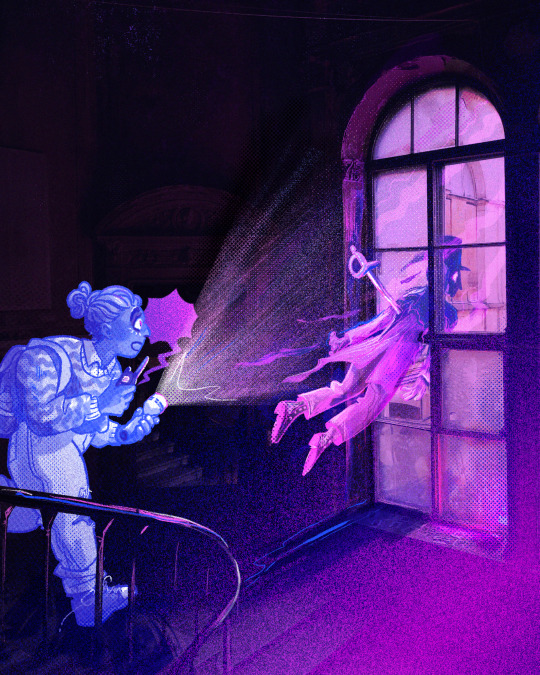
Hey guys? I think there's something here with me on the stairs…
Find your greatest fear, spill your worst secrets, and get to the thrilling seance in This Discord Has Ghosts in It.
Enter and explore a haunted house filled with ghosts. That haunted house is a Discord. Play as investigators exploring the house and the ghosts who are haunting it, working together to create a night both the living and dead will never forget.
Featuring art from the wonderful @kayleerowena!
This Discord Has Ghosts in It is available now at Good Luck Press.

#ttrpg#ttrpg design#indie ttrpg#tabletop roleplaying#haunted#hauntings#tabletop#tabletop rpg#tabletop games
1K notes
·
View notes
Text

CASE&SOUL, my lightweight, forged in the dark mecha action ttrpg, is OUT. Featuring gorgeous new cover art by Tan Juan Gee, a rebuilt layout, an entirely new Gamemastery section, and more. Go get it!!! https://weregazelle.itch.io/case-and-soul
170 notes
·
View notes